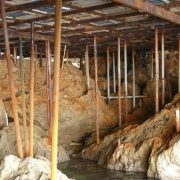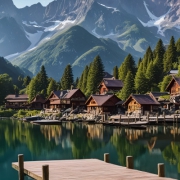Leapfrogging – LNG for Africa
Many African countries are oil producers but they are also beset by frequent power outages. At the same time, they flare Natural Gas in huge volumes. Infrastructure to bring that gas to power plants and then further distribute electricity is weak or non-existent. That could be a blessing in disguise as the continent is on the verge of an energy revolution.
My father was a sailor and his tales of faraway countries, mysterious cultures, and rousing adventures had dominated my childhood. So much, so that at the tender age of 17, I was so eager to become a sailor myself, I decided to jump on a train to Hamburg (the mentally closest port to Austria) and get a job as – who cares as long as I would be able to see the world.
The trip was a colossal failure, as I was too young to be taken seriously by shipmasters but it was the beginning of a life of endless travel. One thing hit me very early in my life. Calling friends in the Middle East and Africa (frequent destinations of my travels) was not only expensive – it was also very difficult to get hooked up in the first place plus quality was generally very bad. So calling someone in those countries was a hit-and-miss affair. The reason was quickly identified. Lines to and from Africa were generally bad, insufficient in transmission capacity, and beset by frequent power outages.
Fast forward to 2008. It was the beginning of my great African adventure with EconGas when I tried to secure volumes of LNG for the GATE terminal. One thing struck me immediately. Everyone in Africa had a Mobile Phone and depending on what country you were in, connections were not bad at all. Telephony was so reliable that it became a business tool to almost forget about. In Africa, that is a boast.
Africa had made a great leap in just a few years from a region of extremely insufficient communication possibilities to a continent where the internet and telephone are almost ubiquitous. How did that happen so fast?
It all goes back to quantum leaping or leapfrogging as some used to call it. A person, company, society, or country (or whatever body of people you might choose to add) generally stays back as compared to others in a certain field. The others soldier on and go through the evolutionary process of trying out all options, preserving the good ones, and killing off the bad leads. This is how innovation works. It’s an expensive and inherently wasteful process but it’s the only way to get ahead if you are on the pinnacle of technological prowess.
For a long time, Africa was at the tail end of economic development. The continent was riddled with conflict, disaster, and economic malaise. At one point it was described as the lost continent. Asia had its miracle, South America its revival but where was Africa in the process? Look again. Right now, we are on the verge of an African miracle of unseen proportions and this one goes way beyond the extractive industry. It touches all economic sectors of the continent and reverses age-old structures with incredible speed.
The mobile phone revolution is just the most obvious and telling example of this shift of fortunes. A much more important one is a silent realization that Africa has to fix its electricity problems and even more the realization that the solution will not lie in mimicking the Western world. The Western world (please let’s not debate what that is right now) had many decades to build up the elaborate pipeline and electricity grid networks it features right now. At the time when they were installed, a combination of technological need, monopolistic thinking, and a general knack for centralistic structures dictated their construction.
Once such a system is in place, it’s very hard to get unhooked from it (and I will post on this later). If an alien landed on Earth today and would have to pick a language to learn to be able to communicate with humans, would you think he would pick English? If he examines the world as it is and realizes that English is the most important language for economics and many other affairs, he would maybe even consider it a safe choice. But if his choice depends more on the ease of the structure of the language, consistent grammar, and a consolidated vocabulary base, then English most certainly would not come out on top. He might instead consider Bahasa Indonesia to name one example.
The same holds for energy infrastructure. Gas pipelines and long cables to transport electricity are necessary if you transport those things over long distances and then spread this big lump of energy over a large area.
But let’s turn this on its head. Let’s assume that electricity generation does not happen in big block power plants anymore but through myriads of small generators. Some would argue, that this is inefficient as larger plants enjoy economies of scale that the smaller units cannot possibly match. I beg to differ. That same rationale would dictate that mainframe supercomputers must be cheaper per byte of capacity than desktop PCs. Funnily, the contrary is true.
Mass production brings down costs with smaller, standardized units to the point where the large, hand-carved, behemoths of plants cannot possibly compete anymore. And efficiencies for those smaller generators are easily matching those of the big boys today. So if the small fry is as efficient but still cheaper than the big folks in converting primary energy carriers into secondary energy, what do we need the big stuff for then?
In Africa, a system of myriads of small generators is currently in place. Its backyard power generation is by diesel generators. This is dirty and wasteful, as diesel is real garbage and produces poisonous fumes that cause cancer plus it’s expensive. Besides, the average current generator generation in Africa is on the dilapidated side.
The challenge is to bring natural gas to those generators. But pipeline building to every household would be astronomically expensive. Much easier would be a fuel that mimics the way diesel was distributed. And LNG can be such a fuel. Because it’s very similar to diesel except that it is much cleaner and cheaper.
In Africa’s case, it could even be dirt cheap, as myriads of flares could be converted to LNG to produce power (and fuel but that again is for another post). This gas was an environmental concern so far and could be turned into power for the people of Africa instead of being exported at any turn.
Why is using LNG for power production in Africa better than exporting it to earn some foreign exchange? Well because in many cases the cash earned through LNG is needed to subsidize diesel purchases in the first place. That costs more than LNG sales bring. Besides, even if a country produces its diesel, this diesel could then be exported for better money than LNG. The LNG would then be used locally to power the economy and would also allow the country to improve its environmental credentials. Because also Africa becomes green nowadays. With rising affluence, Africans demand a better environment for themselves and their offspring.
Today’s modular standardized LNG technology plus advances in electricity generation make this not only a feasible alternative. It might indeed be a model for the so-called developed world to mimic. Because converting flares into electricity and fuel for the energy-hungry populations of Africa might be a better use of the “blood of the soil”.
And such a system could evolve from within without the need for any big master plans or strategies. Those grandiose schemes have never worked in the developed world, what makes us believe that they are going to work in Africa now? They are not and we see the results clearly with failing energy infrastructure and scorched land everywhere on the continent. Small flare capture and LNG to power projects would just blend in and each one of them does not present insurmountable financing challenges.
What is needed to make it happen?
First of all African governments must come to realize that flaring is not only a waste of resources, it also spoils the land, water, and air they use for a living. This should have a price so oil producers failing to support anti-flaring must be penalized. One way to let them off the hook is if they donate the flared gas to a developer who converts it to LNG for domestic use. That gets the oil producer a pass from the penalty scheme and the domestic LNG to power developer a reliable gas source. Oh, besides. Make the oil producer make the gas flow somehow stable.
Second, provide a legal and commercial framework for those “LNG to power” developers and investors through bespoke regulation. Some incentive must be found for those who used diesel so far to make the switch.
Third, all African countries have very powerful diesel lobbies. They need to be brought on board as fighting them will be a recipe for endless stalemate. They must have something to win for cooperating but also something to lose for bad behavior.
Africa is rising, no doubt about that. Africans will need cheap, reliable, and clean energy to catch up with the Western world and they have an obvious solution in LNG that will not only solve their endemic electricity crisis. It will also make Africa a much more environmentally friendly continent. As the saying goes – everybody is an environmentalist if it’s for free.


















Leave a Reply
Want to join the discussion?Feel free to contribute!